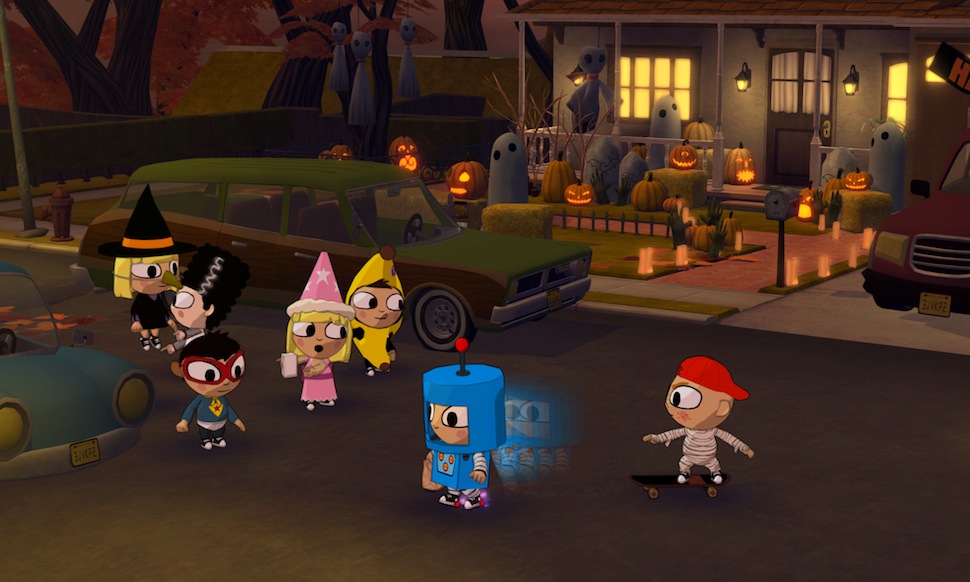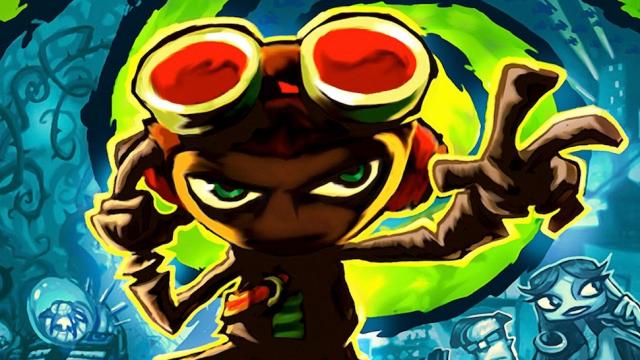These days it can seem like every other video game is a sequel. Everyone loves sequels, right? They’re familiar, they let game-makers perfect their formulas and expand the worlds they’ve created. But a few developers still make mostly new games.
Case in point: Tim Schafer’s Double Fine productions. Of the 15 games the studio either made or has in development, only one is a sequel. And even that game — Kinect Party, the follow-up to Happy Action Theatre — barely qualifies.
Fans love Double Fine’s games, and surely it’d be much easier to make a sequel than it is to crank out new, untested games all the time. Why hasn’t Double Fine made any sequels? During a recent visit to their San Francisco studio to talk about Kickstarter and check out their upcoming adventure game Broken Age, I asked Schafer what the story was.
“Honestly, currently the only reason we haven’t done a sequel is we always have some other idea that we want to do,” Schafer said. “They wanted me to do a sequel for Full Throttle at [Lucasarts] but I had the idea for Grim [Fandango], and if I’d made the sequel for Full Throttle I wouldn’t have made Grim, and so on and so on.”
The constant pursuit of new ideas is a luxury that Double Fine, a mid-sized, independent studio that makes its own creative decisions, can enjoy. Publisher-controlled studios tend to chase the sequel dragon much more deliberately, and any new ideas they have are pitched partly based on their “franchise potential.” Given the state of the industry, this approach is pragmatic: If a video game publisher sees 10 or fifteen years’ worth of games in a single idea, they’re much more likely to bankroll the people making it, who in turn can keep their jobs.
Recently, Bethesda’s Pete Hines said that Arkane’s terrific Bethesda-published stealth game Dishonored had birthed a franchise, meaning we’ll likely get more of those games down the road. I mentioned that recent example and asked Schafer: Does Double Fine ever aim for that kind of thing?
“When we have a game that’s as successful as Dishonored, and makes that much money, we… probably would do a sequel.” Schafer laughed.
“I would like to have a chance [to make a sequel] someday,” he said. “Every one of our games is like, ‘Oh, now I see how to make that game correctly. Oh, I have a lot of ideas of how to make those mechanics better,’ or whatever. So I’d love to get that chance to do that. And there’s certain games that keep popping up, like Costume Quest. There’s an automatic reminder about Costume Quest every year called Halloween, which makes me think about making a sequel to that game every year.”
Broken Age producer Greg Rice chimed in. “Making a new game is hard, there’s so many questions you’re answering; when you go into a sequel you’ve already answered a lot of those,” he said. “It’s kind of just building out more content. But we like taking on new, creative art tasks.”

Schafer says that the likelihood of a Double Fine sequel has increased significantly since his studio adjusted their approach to allow for the simultaneous development of multiple smaller games. That change, fittingly, happened when they had to adapt to survive after publisher Electronic Arts passed on having Double Fine make a sequel to Brütal Legend in 2008. This could have been a ruinous turn of events, but Schafer responded by splitting the studio into four teams and pitching and selling their Amnesia Fortnight game concepts — Stacking, Costume Quest, Iron Brigade and Once Upon a Monster. It worked, and Double Fine was saved.
“I have ideas for [all of our games] to be sequels,” Schafer said. “But also, we’ve structured our company differently to make it more likely that we could do a sequel now, because we have more teams. When it was just me, and it was one game after another, you’re making a sequel at the expense of something else. But now we could have a team make a sequel to one of our games while another team was working on a new property.
“If you look at the last Amnesia Fortnight,” he continued, referring to the studio’s second, 2012 pass at the Fortnight idea, “most of the games pitched were not genres we’d done before. There’s something about our company where we like to try new things.”
I mentioned the fact that fans so regularly ask Schafer about a sequel to his much-loved adventure/platformer Psychonauts that the question is immortalised as a joke on the company’s FAQ. “I don’t think there’s any game I’ve ever made that [fans] don’t ask that,” he said, “and I see that as a great compliment, as a great, humbling thing.
“If someone wants you to make a sequel, that means you did your job, that they want more. But it doesn’t necessarily mean that’s the thing they really want. They really maybe want a new game. They [just] don’t know it until you make that game, and that’s their favourite game.”

Comments
9 responses to “Why Tim Schafer Doesn’t Make A Lot Of Sequels”
I admire Tim Schafer as a creative, but not as a project manager.
http://potaku.com/2013/07/04/red-rants-double-fine-the-triple-constraint-and-the-whole-tim-fandango/
http://crescentflame.files.wordpress.com/2013/03/shamelessplug.jpg
I’d argue that its due to him not creating a run away financially successful game
I have a weird relationship with Doublefine. I love what they stand for, I love everything Tim did up to, and including, Psychonauts, and I’ll watch, listen, or read every interview he does.
I’m just not very interested in their games. I have pretty much all of them, most coming from the recent Humble Bundle, and I kind of gave each of them a go but stopped playing because I just wasn’t having all that much fun.
So the only thing I would actually like a sequel to is Psychonauts. Or maybe some kind of Brutal Legend Adventure that gets rid of the open world and RTS bits and just does the combat and story bits that were actually fun.
I got them all from the Humble Bundle as well, but I loved them. I think of them more as examples of great game design, just really shallow (Costume Quest and Stacking).
Also, why does everyone hate the RTS parts of Brutal Legend? It wasn’t amazing but it was fun in it’s own way
Yeah, they’ve been fun ideas that didn’t sustain my interest for the full duration. There are a lot of games like that, though. Even some utterly brilliant gameplay concepts can’t be spun out beyond a very short period.
I didn’t necessarily hate the RTS parts, but they were clunky and frustrating and, to me, just weren’t a whole lot of fun. As a brief diversion I would have been fine with it, but I didn’t think the mechanics were strong enough to build then entire later part of the game around. I certainly have no interest in them revisiting the concept, at least not without some kind of dramatic overhaul.
I actually really like double fine’s games, there’s just not a whole lot of replay value to most of them.
Speaking of the DF FAQ, this might also indicate a reason:
Allow other people to make money from your art?
Heresy!
Very well written article. I agree with this completely. However, I’m baffled by the negative press somewhat. I understand people have paid money to see this game be made – but it’s silly that the initial optimism has disappeared for some.
If Double Fine just said “we’ll ship it when it’s done” would people be less mad? This isn’t a pre-order, it is support for a product. The really negative things to take from this, as the article alludes to (as does OP), Schafer’s creative side appears to get the better of him on every project he leads. This shouldn’t matter to fans – if anything it should excite them (and possibly worry them that DF could get into a financial mess). Not anger them.
But I don’t know maybe I’m missing something here. Paying money = entitlement and expectations isn’t completely unfair I guess.
On the topic of the actual article – It would be nice if they made sequels to some of their better sellers – It could give them some stability to develop even more original stuff.